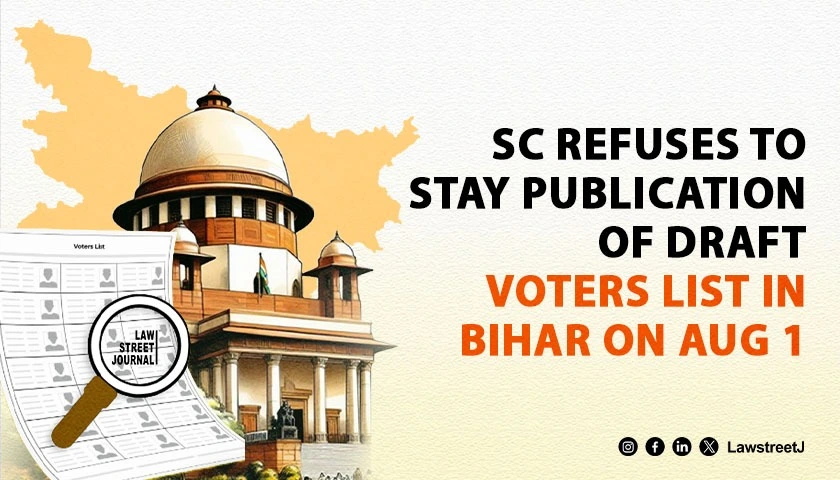NEW DELHI: The Supreme Court on Monday refused to grant any stay on the Election Commission's decision to publish draft voters list on August 1, 2025 on the basis of special intensive revision of electoral rolls in Bihar ahead of Assembly polls in November, this year.
The court, however, asked the poll panel to consider including Aadhaar and Voter ID cards for the purpose in view of their statutory correctness.
Taking up a batch of petitions challenging the EC's exercise, a bench of Justices Surya Kant and Joymalya Bagchi declined to stay the publication of draft list.
The bench, however, assured the petitioners that the court can strike down the entire process if any illegality was found.
Appearing for NGO Association for Democratic Reforms, senior advocate Gopal Sankaranarayanan, submitted that the plea for stay was not made earlier, as the court agreed to examine the matter before publication of the draft list.
The counsel for the petitioners also submitted that the EC was not considering a suggestion made by the top court on July 10 on including of Aadhaar, EPIC and ration cards as valid documents.
Senior advocate Rakesh Dwivedi, appearing for the EC, said reservations have been expressed over those documents in the counter affidavit. He also said so many fake ration cards have been issued.
The court, however, asked the counsel to consider those documents, saying any document on the earth can be forged. The bench also said instead of en mass exclusion, there should be en mass inclusion in the voters list.
Justice Kant, who presided over the bench, said the detailed hearing could not take place in the matter as he was to attend a meeting for administrative purposes. The court asked counsel to inform about the tentative time required for concluding arguments in the matter.
On July 10, the Supreme Court had asked the top poll body to consider the three documents, Aadhaar, EPIC and ration cards, for the SIR, as they formed the foundational records to obtain any of the 11 documents, including residence and caste certificates, listed by the Election Commission for the, verification of voters.
The EC, however, justified its decision, by contending that Aadhaar, Electoral Photo Identity Card (EPIC), and ration card could easily be faked.
In its affidavit to the writ petitions challenging the validity of the SIR, the EC said EPIC by its very nature only reflected the current state of the electoral roll and cannot in itself establish antecedent eligibility in the electoral roll.
"The conceptual and procedural integrity of a de-novo revision would stand undermined if EPICs which are merely reflective of prior entries, are used to validate entries in a roll that is required to be constructed anew," it had said.
The EC also said due to widespread existence of fake ration cards, it has not been included in the list of 11 documents to be relied upon for screening eligibility under Article 326 of the Constitution. It also pointed out a bare perusal of Aadhaar card showed it contained a statutory disclaimer that it is just a proof of identity not of citizenship.
The poll panel also maintained the entitlement to vote flowed from Article 326 read with Sections 16 and 19 of the Representation of People Act 1950 and Section 62 of the RP Act 1951 which contained certain qualifications with respect to citizenship, age, and ordinary residency.
"An ineligible person has no right to vote, and thus, cannot claim a violation of Articles 19 and 21 in this regard," it had said.
In its rejoinder, the NGO said the refusal by the Election Commission to accept Aadhaar, Voter ID, and ration card as valid “standalone” proof for inclusion in the electoral roll during the Special Intensive Revision (SIR) was “patently absurd”. The 11 documents included in the approved list are equally susceptible to being procured on the basis of fake or false documentation, thereby rendering the ECI’s rationale baseless, inconsistent and arbitrary, it said.

















